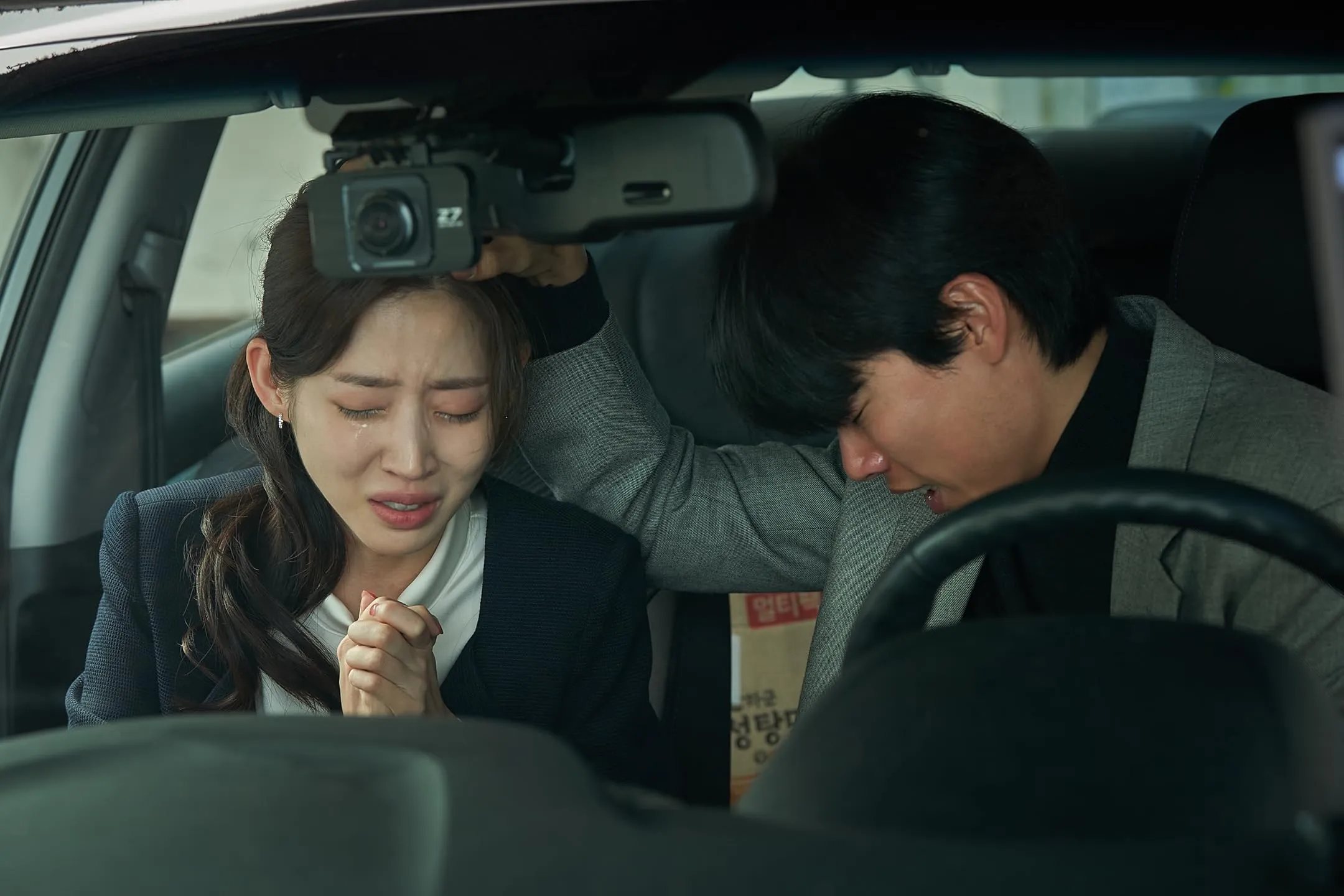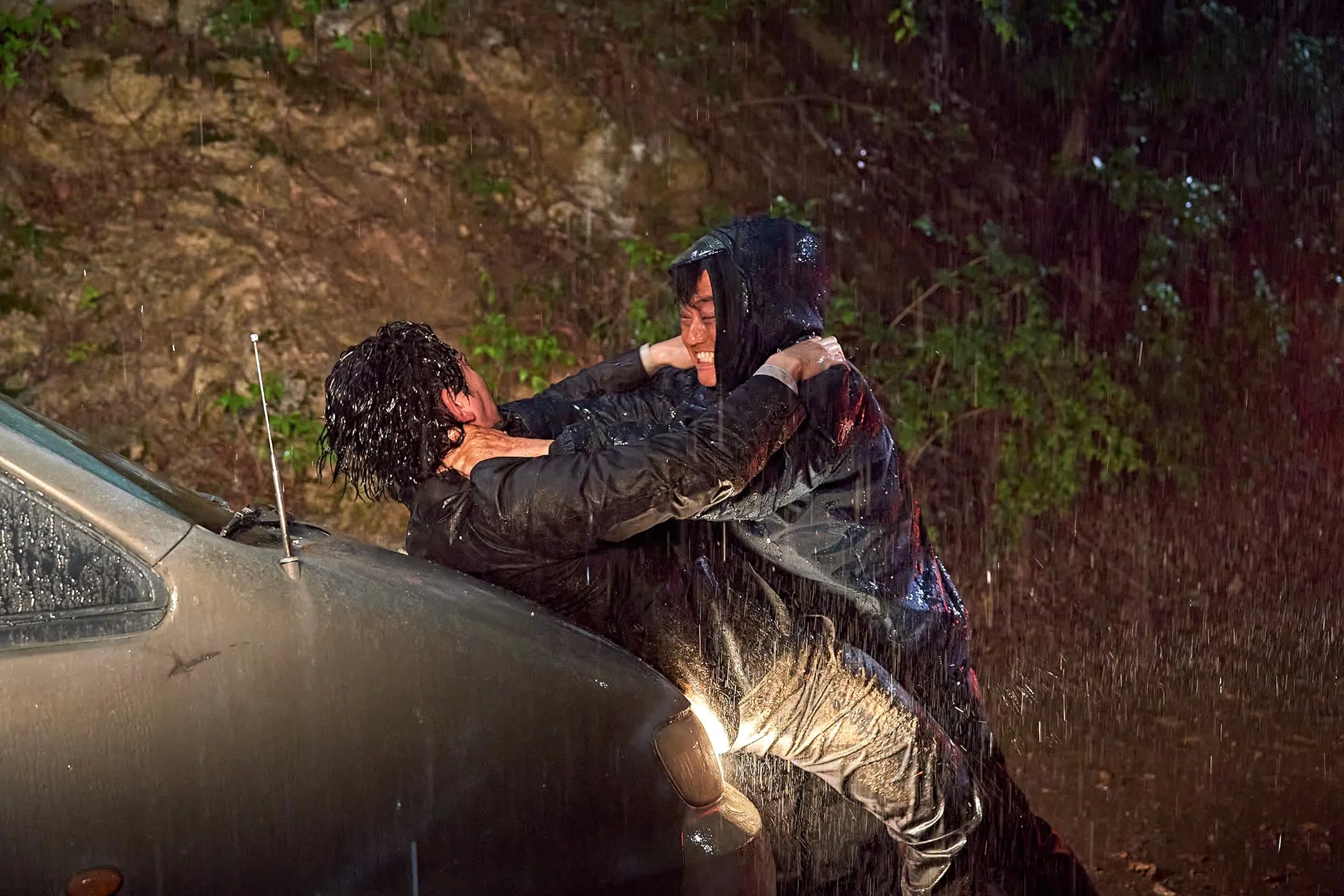A missing child, a pastor certain he’s acting on divine orders, and a detective haunted by her sister’s abduction collide in Yeon Sang-ho’s Revelations. Released on Netflix, this 100-minute psychological thriller charts Pastor Sung Min-chan’s unraveling faith and Detective Lee Yeon-hui’s quest for justice against a backdrop of relentless moral pressure.
Yeon crafts a tense atmosphere, lit by neon red crucifixes and soaked in rain-slick streets, where every vision—be it cloud formations or rock carvings—might carry a message from above or signal a mind tipping into obsession. As Sung’s world fractures under the weight of his wife’s betrayal and his own violent impulses, Lee picks up the trail of Kwon Yang-rae, a convicted kidnapper who may hold the key to both past and present tragedies.
The stakes are clear: recover a child before it’s too late, confront the cost of blind devotion, and decide whether faith can survive when it demands blood. What follows is an examination of story mechanics, performances, and techniques that make Revelations as unsettling as it is unforgettable.
Plot & Narrative Structure
Revelations begins in media res with a drenched church service, where Kwon Yang-rae slips into Pastor Sung’s congregation. Moments later, Sung learns of his wife’s affair and of their son’s sudden disappearance—he assumes Yang-rae is to blame. A chase into the hills ends in a scuffle that appears fatal for Yang-rae, and Sung opts to hide the body rather than notify authorities.
Running in parallel is Detective Lee’s pursuit of memory and vengeance: her sister was abducted and presumed dead at Yang-rae’s hands years earlier. When Lee uncovers evidence of Sung’s cover-up, their paths intersect, twisting the investigation into a moral labyrinth.
Yeon stitches these threads with flashbacks that reveal Lee’s trauma and Sung’s growing fanaticism. The film shifts between past and present, using cellphone recordings and sudden cuts to keep the viewer off-balance. These jumps expose backstory—Lee’s nightmares, Sung’s visions—while advancing the mystery of the missing child.
The climax hinges on a tense face-off in a mountain chapel, where faith, guilt, and survival force Sung and Lee to question the truth behind their actions. An ambiguous coda leaves the audience wondering whether fate or fanaticism led them here. At times the deliberate pace heightens suspense; elsewhere, narrative complexity risks stalling momentum.
Character & Performance Analysis
Pastor Sung Min-chan (Ryu Jun-yeol) evolves from warm-eyed shepherd to fervent zealot. Ryu’s voice shifts from gentle reassurance to clipped declarations as Sung interprets ordinary events—rain dripping on a cross, patterns in clouds—as divine mandate. His posture tightens, eyes gleaming with conviction, capturing a man whose moral compass fractures under pressure.
Detective Lee Yeon-hui (Shin Hyun-been) carries survivor’s guilt like a second skin. Her controlled fury emerges in moments of quiet breakdown: a locked gaze at an empty room, trembling hands on police files. Shin’s performance anchors Lee’s single-minded drive without overselling her grief, allowing flashes of vulnerability when ghostly images of her sister disrupt any sense of control.
Kwon Yang-rae (Shin Min-jae) remains partly obscured—a stoic force whose motivations flicker between menace and victimhood. The film withholds details of his past until late scenes, where a psychiatrist frames his actions as echoes of childhood abuse. This measured reveal invites the viewer to question whether Yang-rae deserves empathy or condemnation.
Supporting roles, including Sung’s unfaithful wife and the enigmatic psychiatrist, frame the film’s moral questions. The chemistry between leads crackles: Sung’s self-righteous fervor clashes sharply with Lee’s tempered resolve. At their best, these performances ground Revelations’ darker set pieces; at its worst, they underscore moments when emotional range feels limited by a focus on plot mechanics.
Themes & Stylistic Elements
Faith vs. delusion: Revelations uses everyday visuals—a cross-shaped rock, angelic silhouettes in rain—to blur the line between genuine revelation and mental projection. The film poses whether belief shapes reality or vice versa, inviting viewers to weigh each vision’s authenticity.
Moral ambiguity: Sung and Lee rationalize violence through vastly different lenses: divine duty and personal justice. The screenplay tracks how both protagonists justify extreme acts, leaving the audience to ponder whether any cause justifies the means.
Visual style: Yeon favors handheld camera work for intimate scenes and wide, desaturated exteriors in the hills, highlighting contrasts between internal turmoil and the world beyond. Neon red church lights recur as a motif—suggesting both sanctuary and warning.
Sound & score: Occasional choral swells punctuate key moments, veering between haunting resonance and heavy-handed punctuation. At times the music amplifies dread; at others it underscores narrative beats too overtly.
Editing & structure: Flash cuts and cellphone footage create a mosaic of viewpoints, though rapid shifts can obscure the timeline. These techniques intensify tension when used sparingly but risk alienating viewers when overapplied.
The film’s stylistic choices deepen its moral maze, even if they sometimes leave the viewer questioning where reality ends and belief begins.
Revelations was released on Netflix on March 21, 2025.
Full Credits
Director: Yeon Sang-ho
Writers: Yeon Sang-ho, Choi Gyu-seok
Producers: Ahn So-hee, Jo Eun-hye
Executive Producers: Alfonso Cuarón, Gabriela Rodríguez, Yoomin Hailey Yang
Cast: Ryu Jun-yeol, Shin Hyun-been, Shin Min-jae, Han Ji-hyun, Kim Bo-min, Kim Do-young, Moon Joo-yeon, Bae Yoon-gyu, Oh Chi-woon, Woo Kang-min, Choi Kwang-il, Lee Se-ho, Do Yong-gu
Director of Photography (Cinematographer): Kwon Young-il
Editor: Han Mi-yeon
Composer: Kim Dong-wook
The Review
Revelations
Revelations is a bold experiment in moral suspense that often fascinates with its vivid performances and provocative questions about faith and justice. Its deliberate pacing and intricate structure occasionally trip over their own ambition, but the film’s unsettling atmosphere and the central clash between Sung and Lee keep its darker currents compelling.
PROS
- Compelling central conflict between faith and justice
- Strong lead performances by Ryu Jun-yeol and Shin Hyun-been
- Visually striking use of color and handheld camerawork
- Thought-provoking thematic exploration of belief and delusion
- Effective use of ambiguous visions to unsettle the viewer
CONS
- Pacing occasionally lags under narrative complexity
- Flashbacks and timeline jumps can feel disorienting
- Supporting characters aren’t fully developed
- Score sometimes overemphasizes suspense
- Climactic coda may feel vague to some viewers


















































